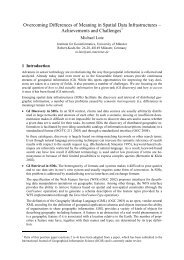Comparative Analysis of NSDI - EC GI & GIS Portal
Comparative Analysis of NSDI - EC GI & GIS Portal
Comparative Analysis of NSDI - EC GI & GIS Portal
You also want an ePaper? Increase the reach of your titles
YUMPU automatically turns print PDFs into web optimized ePapers that Google loves.
This <strong>of</strong> course does not come as a surprise but it is important to have it confirmed by a wide<br />
range <strong>of</strong> national and international experiences, some <strong>of</strong> which have more than 10 years <strong>of</strong><br />
development behind them. Two aspects are worth underlining:<br />
1. Political support at the highest level is crucial.<br />
This is because:<br />
• Most geographic information is collected, maintained, and used by public sector<br />
organisations, which are dependent on the policies set by government in respect to<br />
organisational priorities, funding, and regulatory mechanisms;<br />
• Geographic information is an expensive commodity, as well as underpinning a large<br />
number <strong>of</strong> government services to the citizen. It is therefore an area <strong>of</strong> tension<br />
between policies aimed at maximizing government revenue, and those, such as egovernment,<br />
aimed at maximizing benefits to citizens. Political support is therefore<br />
needed to resolve these conflicts.<br />
• SDIs are not primarily about technology, but about developing a clear framework <strong>of</strong><br />
agreements among government agencies, and between government, the private<br />
sector, and citizens on terms through which the use <strong>of</strong> public sector information,<br />
including geographic information, can be maximized for the benefits <strong>of</strong> all. These<br />
agreements <strong>of</strong>ten require attention and political support at the highest levels.<br />
• Governments therefore play an absolutely crucial role in the development <strong>of</strong> SDIs<br />
and <strong>of</strong> the Information Society because they are at the same time data producers,<br />
users, policy setters, and regulators who provide guidance to major public sector<br />
organizations.<br />
2. Political support needs to be sustained over time.<br />
By their very nature, political priorities may change due to external circumstances,<br />
change <strong>of</strong> administration, or even only change <strong>of</strong> key individuals. The experience <strong>of</strong><br />
some <strong>of</strong> the most well developed SDIs in the world indicates that even after many<br />
years <strong>of</strong> successful development they remain sensitive to changes in organisational<br />
priorities and political leadership.<br />
With these considerations in mind, it is clear that one <strong>of</strong> the absolute priorities for the<br />
development <strong>of</strong> an SDI is persistent action to gather and maintain support among political<br />
decision makers at all levels. Political support is needed to endorse and propagate the vision,<br />
establish the legal framework, and allocate resources to get results. This requires selling the<br />
benefits <strong>of</strong> SDIs throughout their development, without ever taking support for granted.<br />
Selling the Benefits<br />
An SDI can and should be developed at local, regional, national, European, and global levels.<br />
Therefore, there is a need to address politicians and decision-makers at each <strong>of</strong> these levels<br />
and demonstrate the benefits <strong>of</strong> having an SDI.<br />
The benefits have to address areas <strong>of</strong> high political priority such as crime reduction, health,<br />
education, spatial planning, environmental protection and disaster management. One must<br />
demonstrate how to support e-government and general economic development, reduce<br />
duplication and waste <strong>of</strong> resources, and increase competitiveness through the development <strong>of</strong><br />
new industries in the location-based services.<br />
To demonstrate such benefits it is possible at the beginning to use examples and cases from<br />
other parts <strong>of</strong> the world, suitably adapted to address local concerns, and as the local SDI














